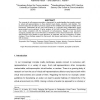Free Online Productivity Tools
i2Speak
i2Symbol
i2OCR
iTex2Img
iWeb2Print
iWeb2Shot
i2Type
iPdf2Split
iPdf2Merge
i2Bopomofo
i2Arabic
i2Style
i2Image
i2PDF
iLatex2Rtf
Sci2ools
118
Voted
PSYCHNOLOGY
2010
2010
Exploring Self-Presence in Collaborative Virtual Teams
The concept of self-presence provides a framework for understanding how people connect to virtual self-representations on three distinct levels (body, emotions, and identity). The present study aims to build on previous support for the reliability and construct validity of this framework. Participants (N=81) who used avatars in a semester-long collaborative virtual group project were examined. A factor analysis of the Self-Presence Questionnaire (SPQ) was mostly consistent with the framework of self-presence, though a new sub-factor emerged, possibly due to new SPQ items or limitations of the virtual environment. Factors of self-presence were related to social presence as expected, but not to frequency of avatar changes. These findings support the framework, but deeper explorations of the concept are still necessary.
Related Content
| Added | 30 Jan 2011 |
| Updated | 30 Jan 2011 |
| Type | Journal |
| Year | 2010 |
| Where | PSYCHNOLOGY |
| Authors | Rabindra Ratan, Béatrice S. Hasler |
Comments (0)

